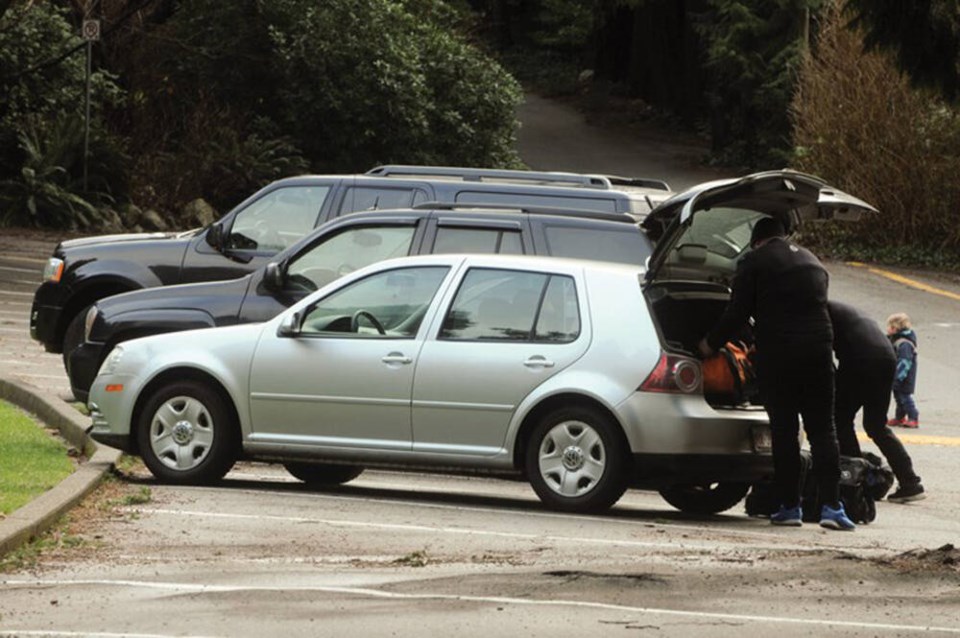When I moved to West Vancouver, I lost count of the number of people who would wax eloquent on its great attributes and end the praise the same way: “And there’s free parking.”
Just my luck. That’s changing.
The district, having resisted the temptation to charge for parking since the horse-and-buggy days, is heading down what could be quite the slippery slope, pulled by the same gravitational force of easy, justifiable revenue most municipalities just can’t resist.
There is a bit of a dark side to the imminent project to make people pay: seeming distress over the deluge of out-of-town visitors to our parks. Another edgy issue: rather than continue to “engage” the public on this, council chose at a recent closed meeting to merely “inform” the public of its plan.
But first things first on the plan.
At its Monday meeting, council unanimously agreed to proceed with a program to steadily roll out parking charges. Not everywhere at first, not even in busier or parking-scant places you’d think of as candidates, but in three parks – as a prelude to three larger parks abutting commercial areas, which presumably will be a prelude to what most every other community does to charge, charge, charge.
The district has discussed this ad nauseam. The latest staff report makes note of proposals to council dating back to 1997. We’ve stalled long enough to actually bypass the pay station era and embrace the arrival of cellphone e-commerce technology to implement the plan.
And, to give credit for being clever enough at first, the initial policy is aimed only at parkgoers with a modest initial $20 annual pass for West Vancouver residents. Those of us who aren’t up for (or as the kids say, down for) hikes or attractions in Lighthouse, Whytecliff and Nelson Canyon parks will not be tapped.
Visitors to West Vancouver will be on the hook for $3.75 an hour, year-round, and Mayor Mark Sager says the aim here is for “the primary revenue source” to be visitors. Coun. Sharon Thompson added that “as much as we’d like to share our beautiful beaches and parks with the public and the region” – that is, with non-West Vancouverites – “it’s turned into an issue of management” that stresses the district’s resources. Which should be inferred by said visitors that the freebie jig is up and it’s time to pay if you wish to play.
The first revenue estimate isn’t epic: about $255,000 a year, less a third-party management fee.
It’s the next chapter down that slippery slope, though, that is bound to get much more attention and friction, because that’s when paid parking would come (after a review) to prominently placed Ambleside, Dundarave and John Lawson parks – where there are 403, 83 and 52 spots respectively. There are also adjacent commercial zones with free parking that could easily be overrun on nice days or during events by drivers who don’t want to pay.
It’s difficult to see how that modest $20 permit for three parks holds for six parks or the steps beyond. Once you designate a fee to maintain a resource, as is the case here with park maintenance and improvement, the fee has an organic way of growing to do more and more for that resource.
Indeed, Thompson envisions the three-park “starting point” will reach into commercial areas, if cautiously. “I know historically this has been controversial,” she says, “but I believe this is the time to move forward with this.” On this, one would hope that the “inform” approach to the public again returns to the “engage” approach to consult on change.
Many communities significantly depend on parking in their diverse revenue stream. West Vancouver collects fees on all sorts of things, but our tax diversity is constrained by the absence of industrial land revenue. And of the property taxes, 97 per cent are from residences; only three per cent are commercial. Our infrastructure is inherently expensive due to our geography, and it can be argued that our tax base faces questions of sustainability.
So, as Coun. Nora Gambioli noted, this is “the last summer” of free parks. We are no longer outliers, but we shouldn’t fail to note that a piece of West Van culture will gradually disappear down that slippery slope.
Kirk LaPointe is publisher and executive editor of Business in Vancouver as well as vice-president, editorial, Glacier Media Group, the North Shore News’ parent company. He is also a West Vancouverite.
What are your thoughts? Send us a letter via email by clicking here or post a comment below.



